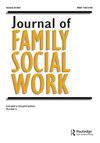将循证实践纳入幼儿心理健康诊所:加强五岁以下儿童和家庭复原力的动态方法
IF 0.7
Q3 SOCIAL WORK
引用次数: 1
摘要
摘要本文描述了在为五岁以下儿童及其家庭服务的幼儿心理健康网络中,劳动力发展、实施和循证实践评估的动态过程。对临床服务提供者进行循证实践培训的有效结构和多年流程的关键特征是能力建设周期:评估、选择、培训、评估。纽约市ECMH网络评估了幼儿临床从业者的能力和能力,并选择了以下循证实践和模式:1)适合五口之家,2)基于二元或家庭,3)基于创伤和/或优势。我们描述了支持有效使用循证实践的评估、需求评估和最佳实践。重要的是,在选择循证做法时,要灵活回应社区的需求,特别注意公平问题。需要注意的是,为这一出生至五岁的人群提供的少数EBP成本高昂,培训师数量有限,可能没有培训师模式,而且很少在多语言或不同的美国社区对这些EBP进行评估。在纽约市实施多年周期的成功在于拥有一个与劳动力密切相关的资助培训中心。本文章由计算机程序翻译,如有差异,请以英文原文为准。
Integrating evidence-based practices into early childhood mental health clinics: A dynamic approach to strengthening the resilience of children birth to five and families
ABSTRACT This paper describes a dynamic process of workforce development, implementation, and evaluation of evidence-based practices (EBPs) within an early childhood mental health (ECMH) network serving children birth to five and their families. The key feature of an effective structure and multi-year process to train clinical service providers in evidence-based practices is the capacity building cycle: Assess, Select, Train, Evaluate. The New York City (NYC) ECMH network assessed the capacity and competencies of early childhood clinical practitioners and selected evidence-based practices and models that are: 1) appropriate for the birth to five population, 2) dyadic or family based, and 3) trauma-informed and/or strengths-based. We describe the evaluation, needs assessments, and best practices that support the effective use of evidence-based practices. It is important to flexibly respond to the needs of the community when selecting evidence-based practices, paying particular attention to equity issues. Considerations to note are that the few EBPs available for this birth to five population are costly, have a limited number of trainers, may not have a train-the-trainer model, and rarely have these EBPs been evaluated in multi-lingual or diverse U.S. communities. The success of implementing a multi-year cycle in NYC lies in having a funded training center closely linked to the workforce.
求助全文
通过发布文献求助,成功后即可免费获取论文全文。
去求助
来源期刊

Journal of Family Social Work
SOCIAL WORK-
CiteScore
2.10
自引率
0.00%
发文量
4
期刊介绍:
Each issue of the Journal of Family Social Work contains peer reviewed research articles, conceptual and practice articles, creative works, letters to the editor, and book reviews devoted to innovative family theory and practice subjects. In celebrating social workers" tradition of working with couples and families in their life context, the Journal of Family Social Work features articles which advance the capacity of practitioners to integrate research, theory building, and practice wisdom into their services to families. It is a journal of policy, clinical practice, and research directed to the needs of social workers working with couples and families.
 求助内容:
求助内容: 应助结果提醒方式:
应助结果提醒方式:


